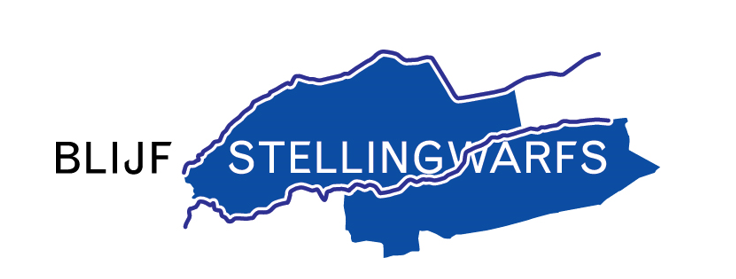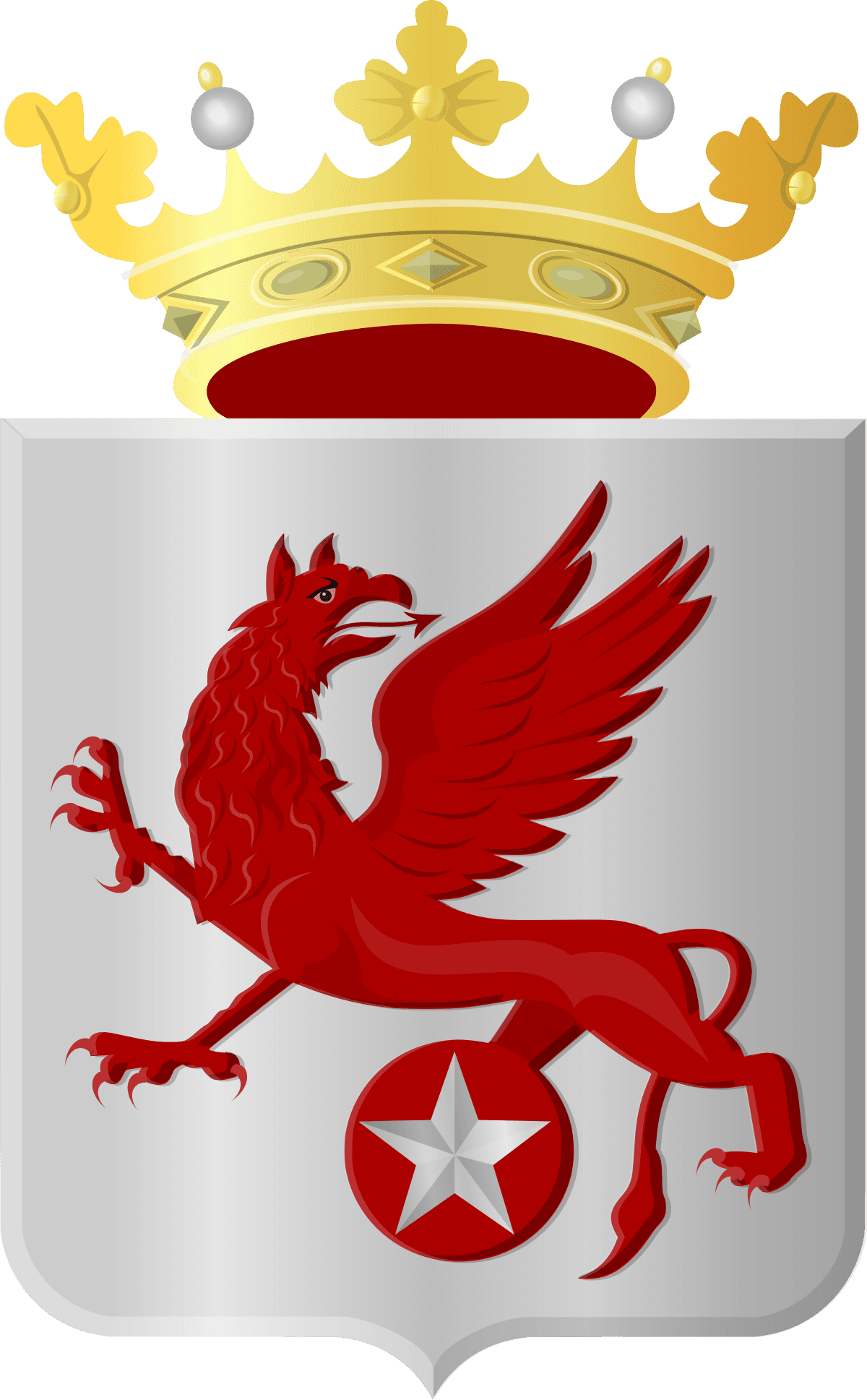Archive 2018
Christmas & New Year
Christmas is a time of roaring fires
the scents of pine branches hot drinks,
good conversations, beautiful memories and
renewed friendships, togetherness...
Staystellingwarfs wishes you a Merry Christmas and a Happy New Year!

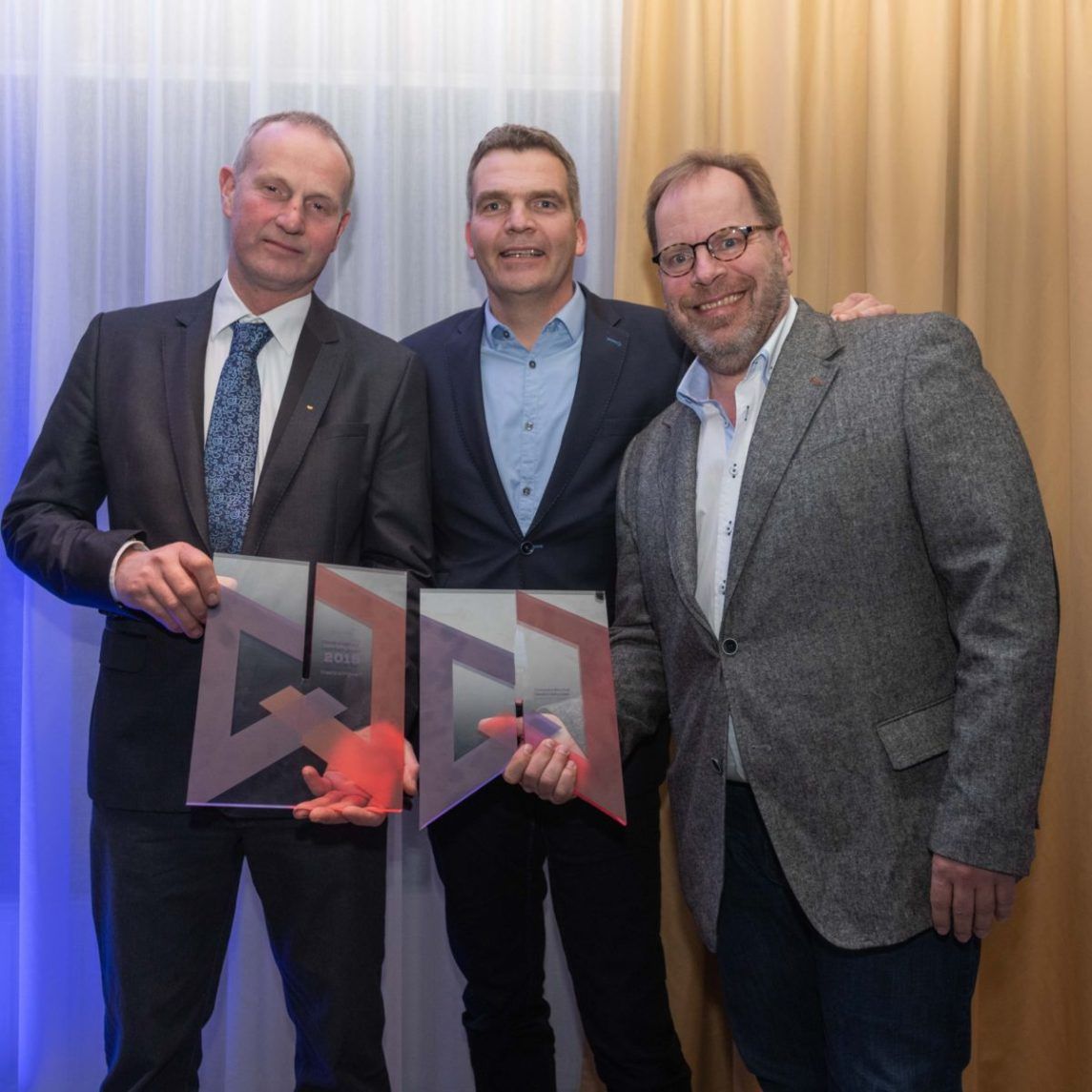
Entrepreneur of the Year 2018
Wolvega – A surprising result in the entrepreneur of the year election. Bernard Wind and Marc Scheijven of Nij Barrahûs from Wolvega and Rinus van der Zijl of Melkveebedrijf van der Zijl from Nijeholtpade can call themselves entrepreneur of the year for a year
Information meeting on gas extraction
Report of information meeting on gas extraction in Weststellingwerf provided by the Ministry of Economic Affairs and Climate on December 6. 2018 in the Town Hall in Wolvega
Who were present?
Various councilors of Weststellingwerf and members of support groups. A delegation with their councilor from the Fryske Marren, from Steenwijkerland, from Heerenveen and many other interested parties.
Opening
Councilor Zonderland opened the meeting, a so-called working meeting, and explained what the intention was. Opportunity to ask questions. That later turned out to be disappointing because there were many questions that could not all be answered. Councilor Zonderland surprised the Council members and the audience with the announcement that Weststellingwerf is not against gas extraction. In doing so, she anticipated the next meeting of January 21, 2019, in which decision-making must take place and where the Council will determine how it views gas extraction and whether the Council will issue a declaration of no reservations for new gas extraction (Rottum) in Weststellingwerf. The Council can refuse this on spatial planning arguments. Rottum would become the seventh gas extraction location in Weststellingwerf. Weststellingwerf will then remain a gas extraction municipality until well after 2030. There is currently no drilling rig for the Rottum gas field in Nijeholwolde. The Fryske Marren and Heerenveen are against gas extraction and against new gas extraction from the 3 Rottum fields.
The Ministry of Economic Affairs and Climate.
Those present heard a presentation about gas extraction in which the national importance was emphasized and the need to extract as much gas as possible from the small fields. Words such as reliable, safe, sustainable characterize gas extraction according to EZK. These are small fields and despite the transition to green energy, fossil natural gas still plays an important role. The fact that the small fields now supply more gas than Groningen was not mentioned. They are becoming relatively more important, EZK stated.
The legislation has changed in such a way that the safety of residents, nature and the environment come first. Whether and, if so, how and when remained unclear. There are great damage protocols in Groningen that will also apply to the small fields according to EZK and the government guarantees more than good damage settlement for all mining damage. EZK had to come back to this later and admitted after a statement from the audience that it was indeed correct that no mining damage had ever been paid out due to subsidence. The audience suggested that a customer satisfaction survey be conducted into claims handling in Groningen.
The licensing procedures and regulatory bodies were then highlighted. These bodies are all part of EZK or affiliated with it. The butcher inspects his own meat. It became increasingly clear that the main concern was to convince the Council in Weststellingwerf to issue a declaration of no reservations for Rottum. So the green light for even more gas extraction in Weststellingwerf. Vermilion, perhaps influenced by the attitude of neighboring municipalities Heerenveen and Fryske Marren who are against gas extraction, has chosen to drill the 3 Rottum fields remotely from the "gas extraction-friendly" Weststellingwerf. Gas extraction that belongs to our neighbors, but we thank them for this honor.
A picture was painted by EZK that everything is monitored very carefully and that the chance of damage is small and the chance of vibrations and earthquakes is small.
It was reported that the extraction will take place through a coordinated procedure, but the consequences of this were not explained. All permits are arranged in one go. As a municipality, you lose control as soon as a statement of no reservations has been issued by the Council.
What remains of EZK's presentation after the question round?
The reality turned out to be different from what was proposed by EZK, including with regard to:
The damage scheme for the small fields should be identical to that of Groningen. So with reverse burden of proof. Even then, the damage settlement is an empty shell due to Vermilion's reluctant behavior to carry out (correct) baseline measurements and due to the marginal approach such as that used in Westerveld by only including a limited number of selected buildings. This still leaves the fact that no compensation has ever been paid for mining damage as a result of land subsidence and that will remain the case in the future if no decisive action is taken.
The baseline measurement is important for proving mining damage due to soil subsidence and has not yet been achieved by Vermilion in various gas fields. People then talk about a stand recording. A correct approach should be for Vermillion to carry out a baseline measurement for all fields retroactively from the exploratory drilling. After all, she knowingly and intentionally failed.
EZk stated that the size of the Rottum gas field (3 fields) is more than 1 billion Nm3 in total. That is not correct. EZK confuses the size of the field with a proposed production quantity. The extraction plan indicates that Vermilion wants to extract 1 billion. The total field is larger. Maybe twice as big. The maximum scenario is almost always won and the annual maximums are exceeded, so that a new extraction plan can be quickly submitted for even more gas extraction during the term of the permit.
EZK stated that the subsidence for Rottum will be a maximum of 1.5 cm. It was not stated that the reliability of this figure is very low. Practice also shows that with all gas extraction in Weststellingwerf the subsidence is always greater than indicated in the original extraction plan.
The extraction permit for the Rottum location (which was previously called Gorredijk) dates from 1989. According to someone in the audience, this means that the permit has expired and that the entire Rottum plan has been scrapped. EZK disagreed.
EZK does not believe in tiltmeters to measure subsidence, vibrations and tensions in buildings and also over time. EZK incorrectly stated that tiltmeters only measure the angle of inclination of buildings. People believe in the KNMI despite the fact that it only registers earthquakes of more than 1.5 on the Richter scale and then only if there are sufficient measuring locations. And there aren't any. She wants to leave the responsibility of measurements to Vermilion.
When asked, EZK indicated via SodM (State Supervision of Mines) that strict compliance with the permit (the so-called Consent Decree and extraction plan) is strictly enforced. In practice, it appears to be quite a job to convince the SodM to enforce the law and this has not yet been successful in Weststellingwerf.
The so-called small fields are seen by EZK as individual fields and are always compared with Groningen, stating that Groningen is one large field. The basins of the small fields in Weststellingwerf and Westerveld overlap. So it would be one field, just like Groningen. The borewells are 3 to 3.5 km apart. In Groningen often even further. EZK could not give a clear answer. It is clear that “small fields” is a misnomer. Some of those small fields are big.
What does putting the safety of residents, their property, nature and the environment first mean in practice when it comes to granting a gas extraction permit? EZK's answer remained just words.
There are 2 categories of earthquake risks in the Weststellingwerf gas fields. Category 1 with 19% risk and Category 2 with 42% risk. Negligible risk falls outside category 1, so to speak, category 0. The categories are a calculation example based on assumptions. Rottum also did not provide any substantiation for the choice of a category. The maximum calculated earthquake would be 2.8 on the Richter scale.
EZK has not reported anything about possible gas leaks and risks of compaction and damage to the water storage capacity in the soil. According to the NAM, in principle all wells leak, according to Vermilion none of their wells leak. Evidence for this (available measurement data) is not made available.
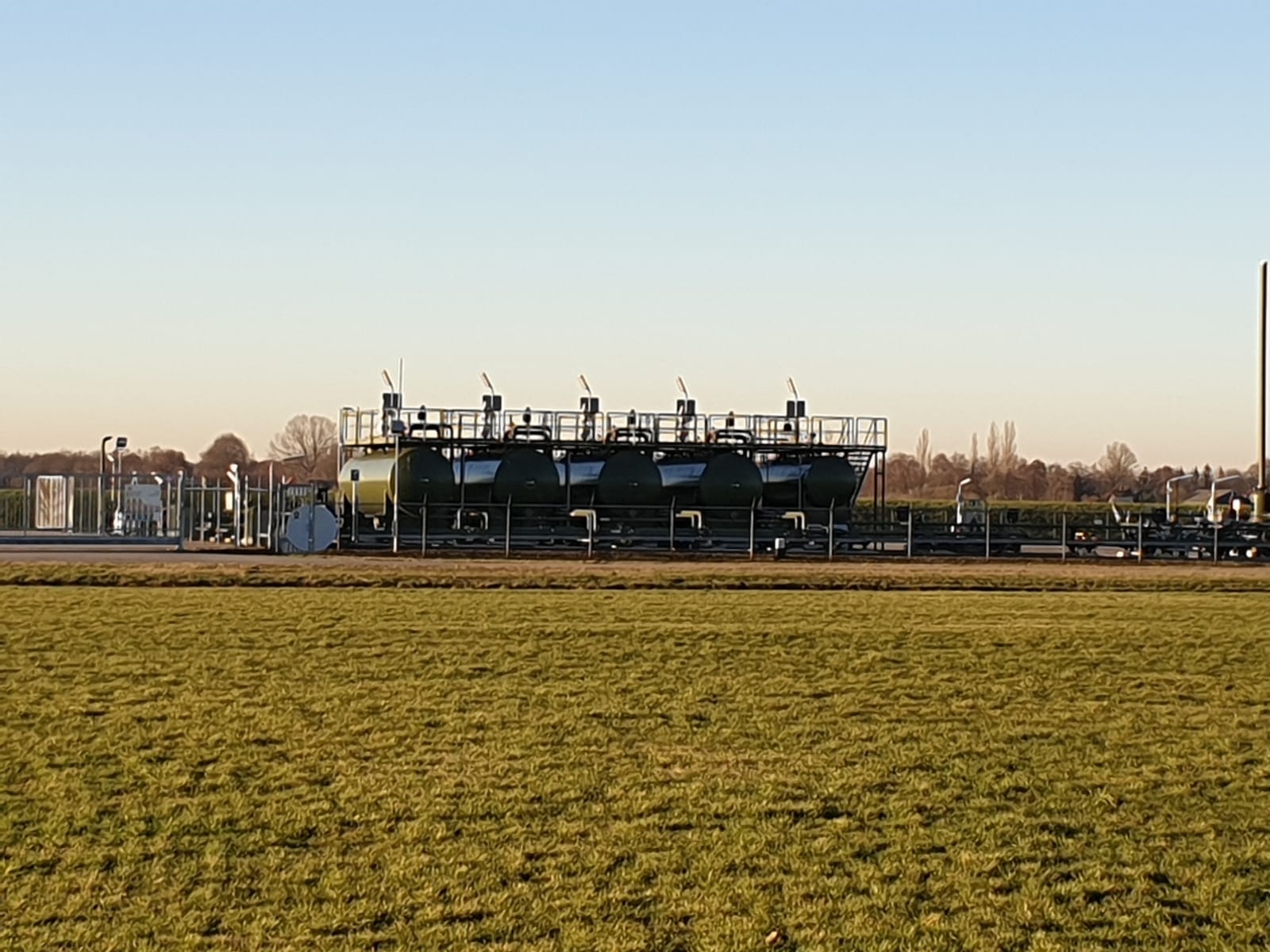

Rinus Buising party leader PBF
Rinus Buising has been chosen as party leader of the independent party Provinciaal Belang Friesland for the upcoming provincial council election on March 20, 2019. Most local parties in Friesland are members.
This also applies to Staystellingwarfs.
BS and the mayor wave goodbye to Annabella
A few weeks ago, Mayor Van de Nadort received a nice letter from seven-year-old Annabella Oostdam. She had an idea. She wants to collect cuddly toys for children in Romania and deliver them herself. Annabella asked the mayor to see her off. It would be nice if he could also take a cuddly toy with him if he had one. And she knew that, because the mayor immediately started a fundraising campaign at the town hall. This morning Annabella left the Tuindorpschool in Wolvega with all her cuddly toys to Romania. The mayor was there, with a wheelbarrow full of cuddly toys!
The idea of Annabella came about as follows. “My mom once made me clean my room. My whole room was full of stuffed animals. There are many people I haven't hugged in a long time. I have a great friend in Romania,” says Annabella. This friend is a helicopter pilot and has a Dutch wife and children. She had heard from him that there are many children in Romania who do not have cuddly toys because their mom and dad have no money. That's why Annabella thought, maybe they can get a hug from me.
That's why she asked her mother if she could give her cuddly toys to those children. She thought that was a good idea. They know a foundation in Romania that helps the children there. This foundation is called 'Our big day out'. The Winter Soldier from The Avengers also helps them.
“I asked my school if all the children wanted to help me, so that I could give as many hugs to the children as possible. But anyone can bring hugs to school. I would like to give the cuddly toys to the children myself. We have agreed with them that we will deliver the cuddly toys to them in Bucharest, Romania at the end of November, so before Christmas,” says Annabella.
In total, more than 800 cuddly toys were collected, 600 at school and 200 in the town hall in Wolvega.
The mother has also started a crowdfunding campaign so that the family does not have to pay the petrol costs alone. If someone cannot give online, people can also put money in the collection box at the Tuindorpschool.

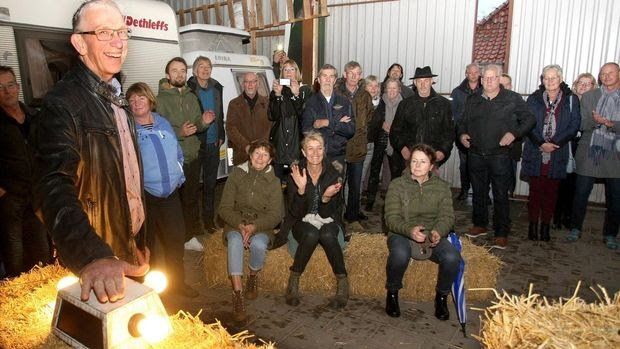
BS present opening poscode rose project
Steggerda opened the first Postcoderoos project in the municipality to great interest. The opening ceremony took place under the watchful eye of the members of energy cooperative De Toekomst, the aldermen Zonderland and Jongebloed and various council members.
With a firm push of the button, roof owner Dominicus de Vries started an overview video of the project, put together by a fellow villager, the young Johan Bouwhuis. From this month, fourteen members of the cooperative will supply sustainable energy to energy company Greenchoice, generated on the roof of a warehouse on the Vaartweg.
Go with that banana
In an explanation, the board members of De Toekomst indicated that they were proud of this project: 'It is the result of joining forces, rolling up our sleeves and going with that banana. Extra proud because the process was mainly carried out by fellow villagers, commercially and with the support of many volunteers.'
Tax benefits
The project offers the opportunity to generate solar energy at a fair price by installing solar panels on someone else's roof. The so-called Postcode project was chosen because it has tax benefits for the owners of the solar panels for a period of 15 years.
Further sustainability
In the meantime, the board has acquired a lot of knowledge about the possibilities of realizing projects in the field of energy savings and the generation of sustainable energy. Thanks to, among other things, a significant financial contribution from Vermilion Energy, the cooperative from Steggerda was able to start its activities. Both parties have expressed the intention to strengthen each other in the coming years to further make the energy market more sustainable.
Support local initiatives
The energy cooperative now has to wait for the cabinet's energy plans to be able to make choices for new projects for its members. The board of De Toekomst has expressed the wish that governments continue to support and stimulate local initiatives. Councilor Zonderland reported on Saturday that the door of the town hall is wide open to move forward together in realizing the energy transition.
John Smith, New York
Low Saxon recognized as a complete, independent language
The tenth of October 2018 should have a special place in the history of Lower Saxony, the Stellingwarver region, the provinces of Drenthe, Grunningen, Overiessel and the regions of Aachterhoeke and the Veluwe in Gelderlaand.
On this day, in the name of Menister Ollongren and in the name of the Lower Saxon authorities, Siktaoris-Generaol Drs. Maarten Schurink of Binderlaan Zaeken declared Lower Saxony a full-fledged, independent language. That happened at a large gathering with many guests in the perveensiehuus in Zwolle. Hester Maij van Overiessel had also welcomed the guests and, in particular, the administrative representatives of the various communities and municipalities. But then they had given a lame explanation. This national recognition is, of course, the basis on the one hand that the regional language organizations and interested groups of speakers would like their language to be officially fully reviewed and, in addition, the responsible regional authorities essentially want Lower Saxony to be an officially recognized language. is as good as recognized languages. However, the authorities want to continue to encourage the use of Lower Saxony, in order to ensure that our language continues to be used vigorously in the future.
The signing was first done on a beautiful country map of Lower Saxony, on which everyone signed in their region, and then the signing was done in real life under the text of the covenant that provides the further explanation. So signed, after the siktaoris general, Cees Bijl van Drenthe, Sietske Popjes van Frieslaand, Josan Meijers van Gelderlaand, Henk Staghouwer van Grunningen, Hester Maij van Overiessel, borgemeister André van de Nadort van West-Stellingwarf and lawkeeper Fimke Hijlkema van East Stellingwarf.
The covenant and the recognition speech are specifically intended to improve the image of Lower Saxony, i.e. to rely on the reality of a normally recognized language, although it is further determined that the Lower Saxon authorities will continue to act to assert and use Lower Saxony. to help, but without new laws and regulations. The insignificant efforts will be worked out in further consultation.
Following the official signing, the public received an 'inspiration programme', with images of beautiful and good use of the Lower Saxony from the various regions. Leaving Stellingwarf, director Sietske Bloemhoff of the Stellingwarver Schrieversronte and his scriptwriter and film director Thomas Rovers gave an explanation of the upcoming film 'That's when the clock tolls again', accompanied by a trailer. The film again focuses on Stellingwarf's freedom struggle in the early 16th century.
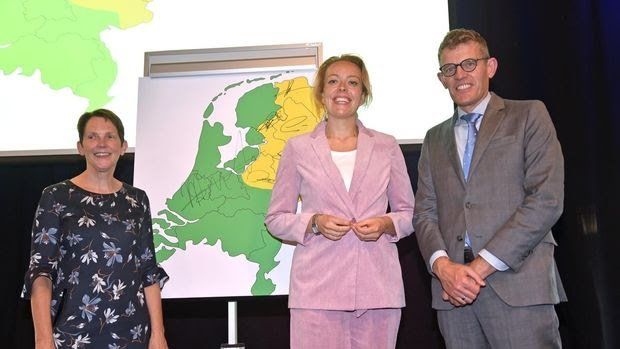

Invitation to installation of new board
Wednesday, September 26 at 8:30 PM General Members Meeting Stay Stellingwarfs at Zalencentrum Klijnstra in Wolvega. Main theme: Election and installation of new board and board members Stay Stellingwarfs.
Gasboring forum meeting
Forum meeting
August 29, 2018, 8:00 PM.
Weststellingwerf town hall


Winning plan Eesveen surprises action group 'unpleasantly'
Eesveen - The decision has been made: gas extraction in Eesveen will be extended from 2019 to 2027. Minister Eric Wiebes of Economic Affairs and Climate has approved the extraction plan that has been drawn up for the gas field. Jeannette van der Velde of Geen Opschudding Gaswinning Eesveen says in her first reaction that she was 'unpleasantly surprised'.
A voice in the back of her mind already said it: the final consent decision for gas extraction in Eesveen will be announced during the holiday period. 'I wasn't wrong. But this is probably a coincidence," says Van der Velde in an understated tone. In any case: more than six months after gas producer Vermilion submitted an application (November 2017, ed.) to extract gas from the ground near Eesveen until 2027, a final decision has been made. The extraction period will be extended and this means that ten times more gas will be extracted in Eesveen than is currently the case.
In the new plan, gas is extracted from two gas wells. The plan will be available for inspection from next Thursday to Wednesday, August 22. Residents can then appeal. The content of the final consent decree is not yet known, but the accompanying letter stating that the seismic risk analysis and the production and subsidence forecasts have been updated raises Van der Velde's eyebrows. 'What does that mean? That surprises us a bit.'
Initially, the extraction plan stated that the chance of earthquakes was 42 percent. 'We were in the highest scale in that regard. Has that been reduced now?' Van der Velde realizes that she cannot yet say a sensible word without having seen the new plan on Thursday, but she is still afraid that the seismic numbers will be lowered without adequate substantiation. 'The updating of production and subsidence forecasts' also worries her. 'For the same amount of money, Vermilion has found more gas and they want to further increase gas extraction.'
Van der Velde will not have any answers until Thursday. However, the action group Geen Opschudding Gaswinning Eesveen is on high alert. She still defends herself tooth and nail against the expansion of gas extraction. She is still fighting for a construction baseline measurement, so that any damage to farms can be covered. Laughing: 'Luckily I'm on holiday. So I have plenty of time to delve into it again.'
Stay Stellingwarfs asked at the council meeting on Monday evening to invite a group of Belgians who are participating by bicycle to the town hall for a four-day event and to offer them a view of the roof terrace. The Belgians accepted the invitation on Wednesday afternoon 04-07.
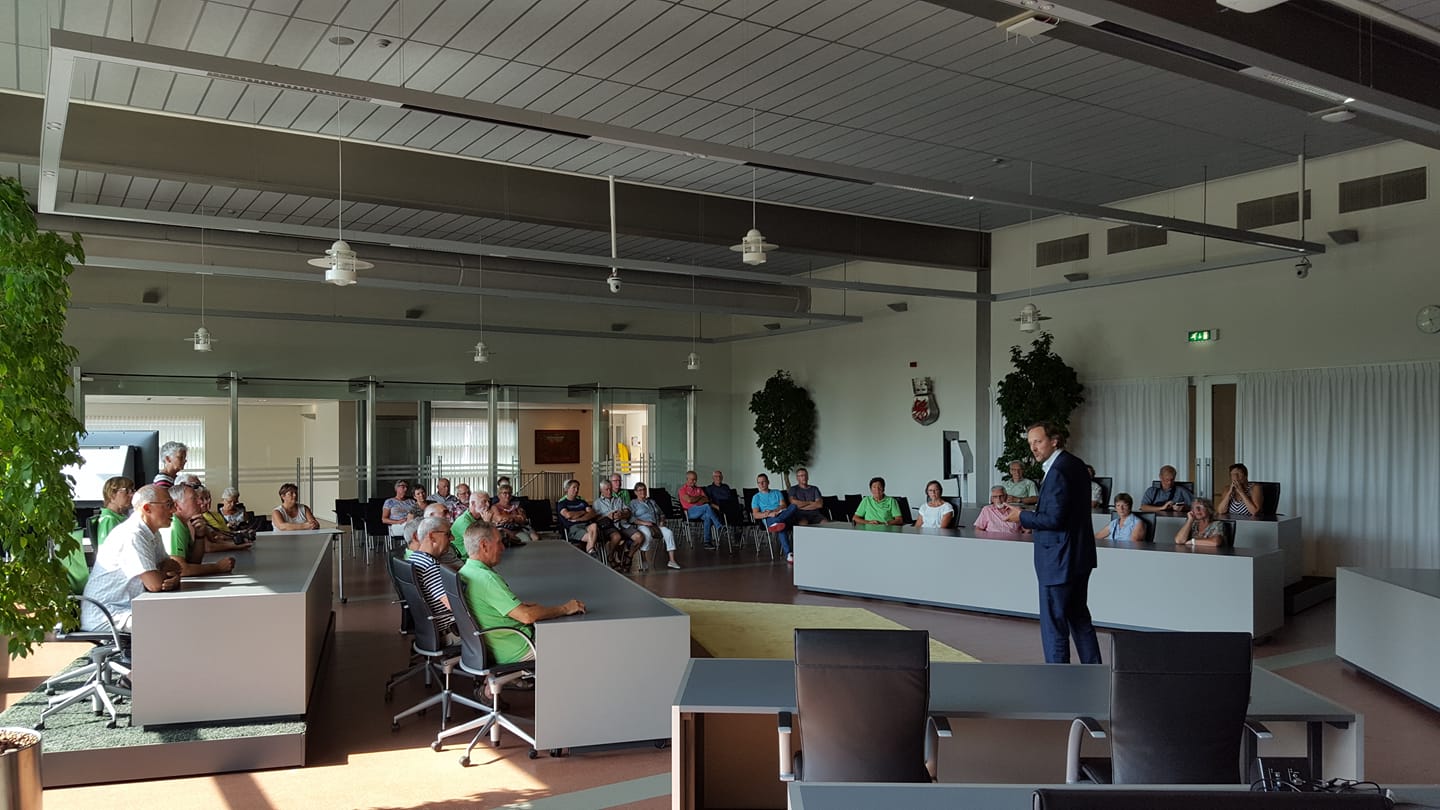
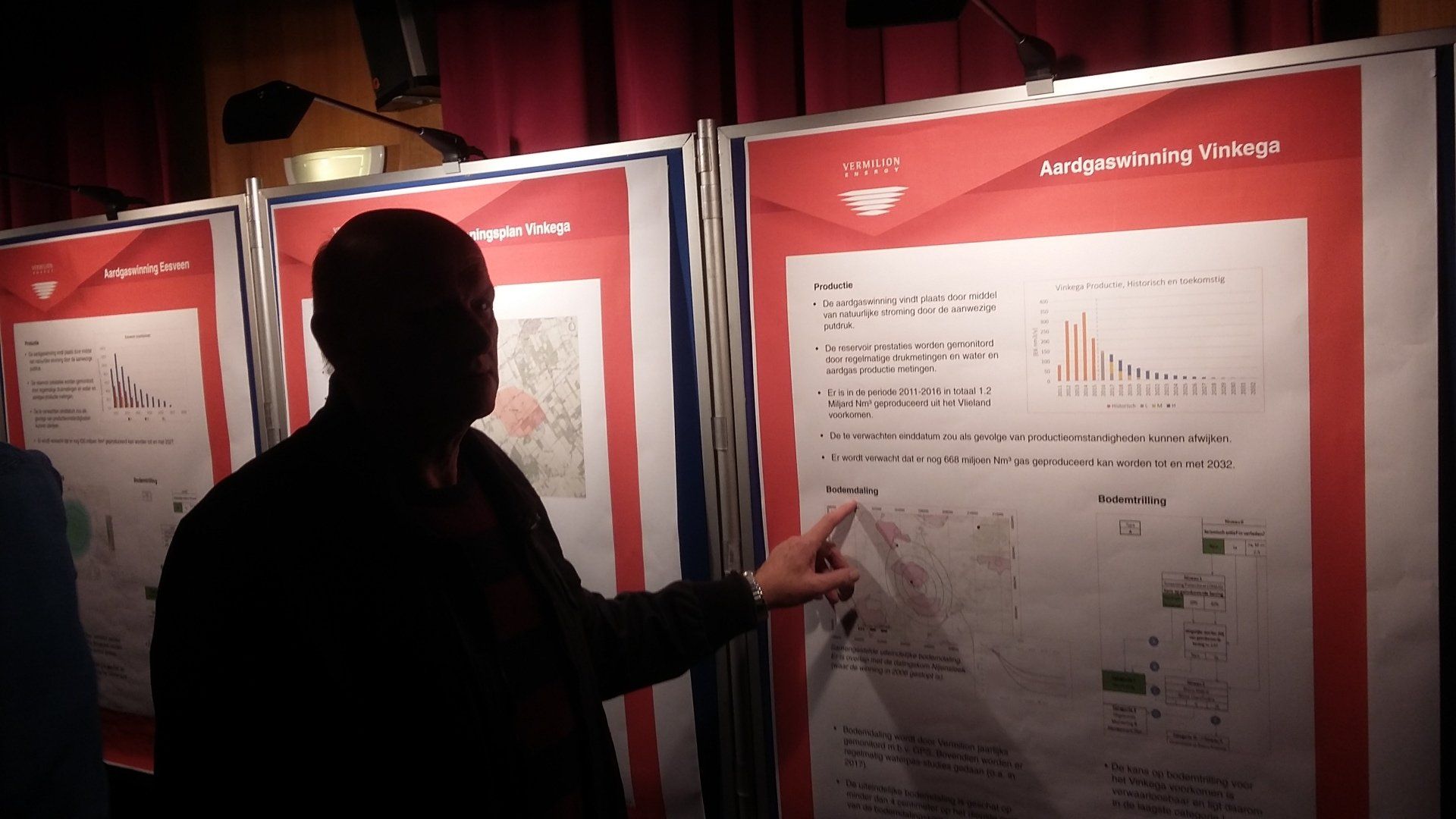
"'Vermillion Gains Too Much Gas'
Posted on Monday May 7, 2018 8:19 PM
According to the council faction of Jouw Stellingwarfs, the company Vermilllion is in violation of the Vinkega/Westvierdeparten gas extraction. The council is not aware of the facts presented by faction chairman Ton Mulder on Monday evening.
Mulder: 'According to our information, Vermillion has been extracting gas in excess of the permitted quantity since February.' Mulder bases this on the extraction plan until 2028. 'As of February 28, Vermillion has extracted 1 million cubic meters (Nm3) above the permitted maximum quantity of 1.448 billion Nm3 until 2028.' Councilor Cor Trompetter was not aware of these technical figures and he expressed his willingness to investigate this further. Only then will he consider whether further steps are necessary.
A draft consent decree from Economic Affairs is now on the table for Vermillion based on a new extraction plan drawn up by Vermillion. Mulder 'As far as we know, no final consent decision has yet been published, to which all submitters of views still have the opportunity to appeal. This means that the existing consent decree from 2011 will remain in force for the time being. In our opinion, Vermillion violates the current consent decree.”
In that case, Mulder wants the municipality to ask the State Supervision of Mines to halt production, he said during the council meeting.
Posted on Monday May 7, 2018 8:19 PM
According to the council faction of Jouw Stellingwarfs, the company Vermilllion is in violation of the Vinkega/Westvierdeparten gas extraction. The council is not aware of the facts presented by faction chairman Ton Mulder on Monday evening.
Mulder: 'According to our information, Vermillion has been extracting gas in excess of the permitted quantity since February.' Mulder bases this on the extraction plan until 2028. 'As of February 28, Vermillion has extracted 1 million cubic meters (Nm3) above the permitted maximum quantity of 1.448 billion Nm3 until 2028.' Councilor Cor Trompetter was not aware of these technical figures and he expressed his willingness to investigate this further. Only then will he consider whether further steps are necessary.
A draft consent decree from Economic Affairs is now on the table for Vermillion based on a new extraction plan drawn up by Vermillion. Mulder 'As far as we know, no final consent decision has yet been published, to which all submitters of views still have the opportunity to appeal. This means that the existing consent decree from 2011 will remain in force for the time being. In our opinion, Vermillion violates the current consent decree.”
In that case, Mulder wants the municipality to ask the State Supervision of Mines to halt production, he said during the council meeting.
Ton and Ruud confirmed as councilors of Weststellingwerf.
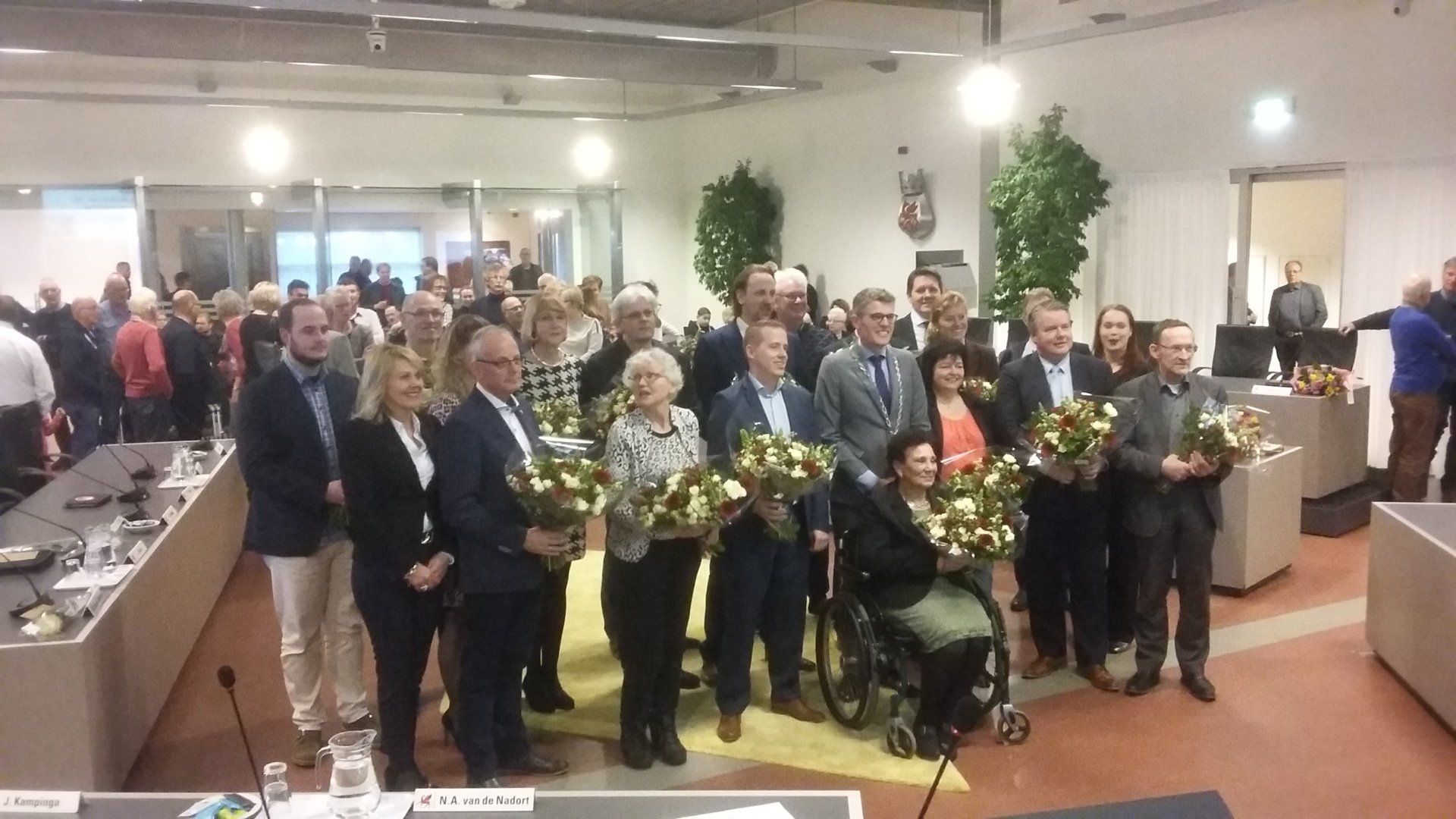
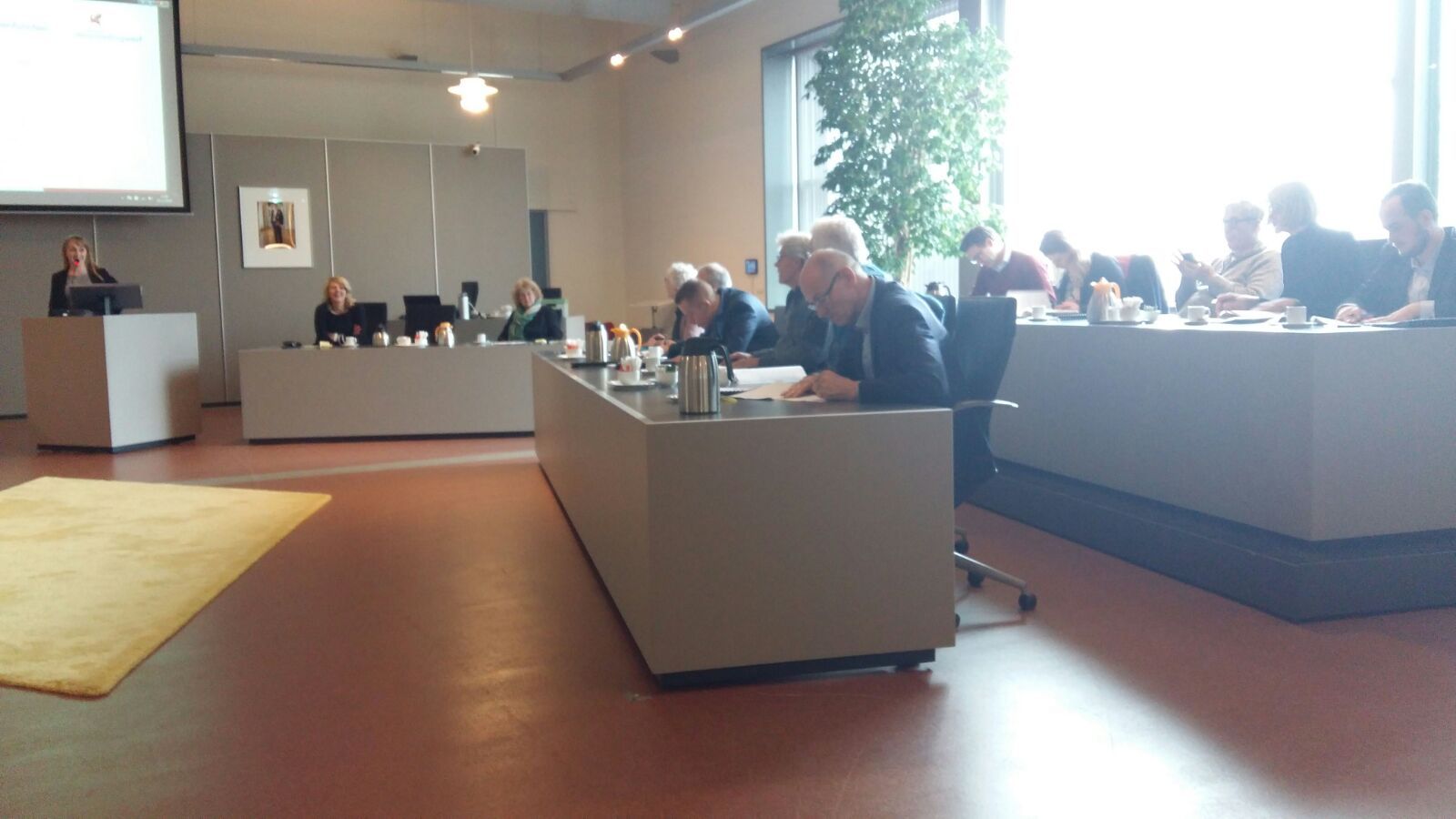
Het signing the statements 23-03-2018 For the first time in the council chamber
The election results
Stay Stellingwarfs has won a total of 2 seats, which is good for his 1013 votes.
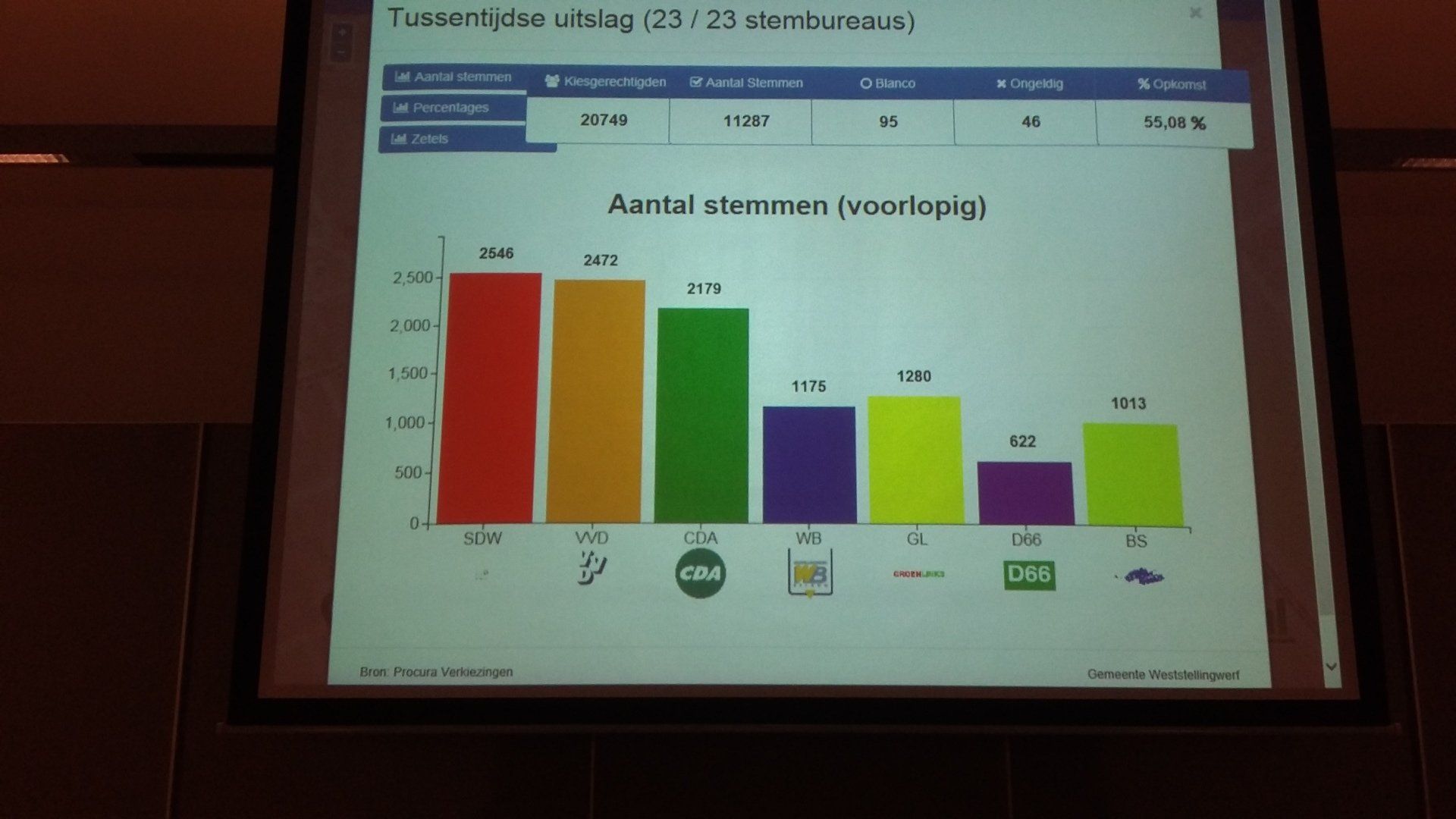
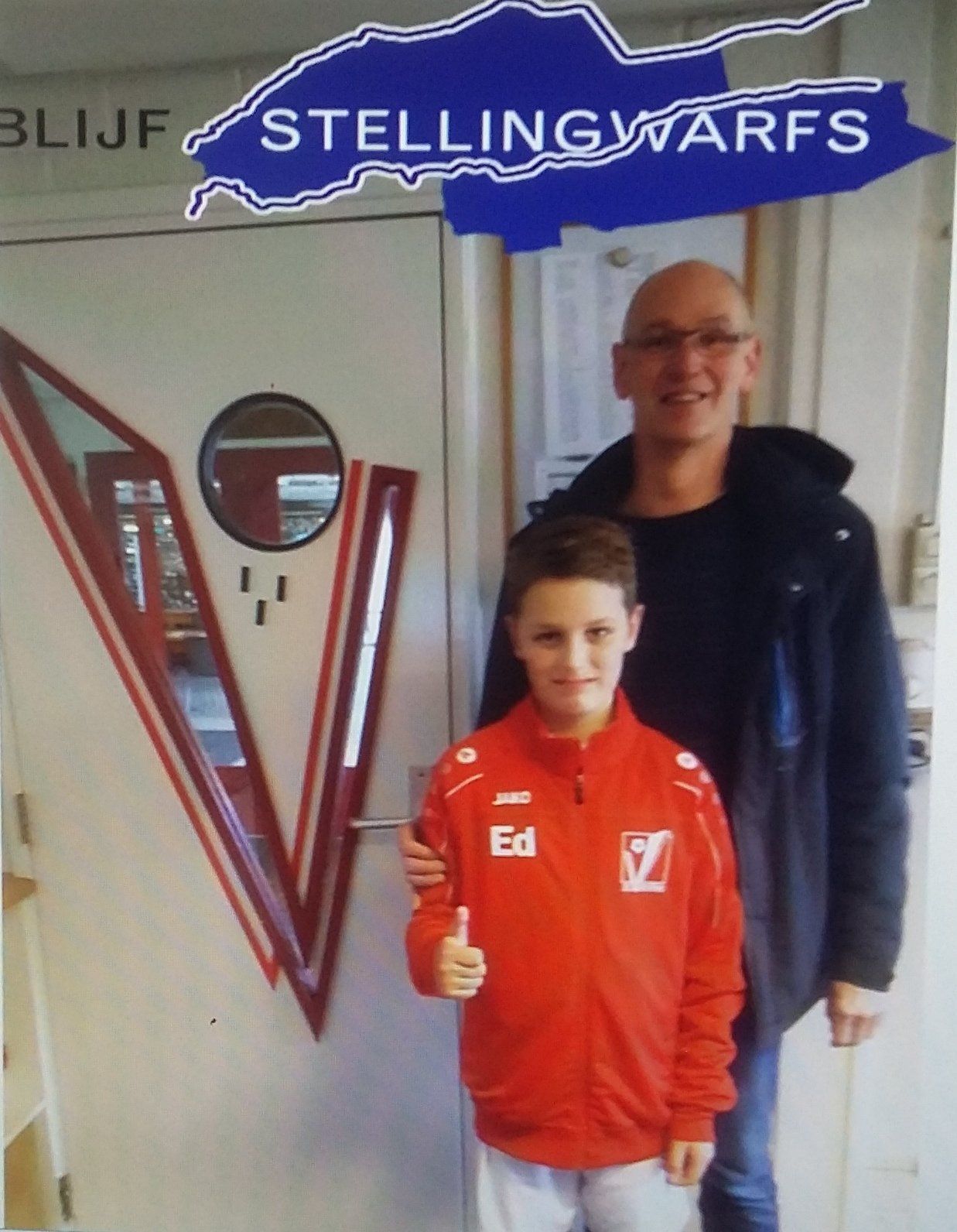
Stay Stellingwarfs sponsored VV de Blesse
List leader Ton Mulder attended together with the pupil of the week (Ed).VV De Blesse.
The competition was sponsored by Jouw Stellingwarfs
11-03-2018.
Presentation Digital House
Stellingwarfs will remain present at the Digital House presentation in the library in Wolvega
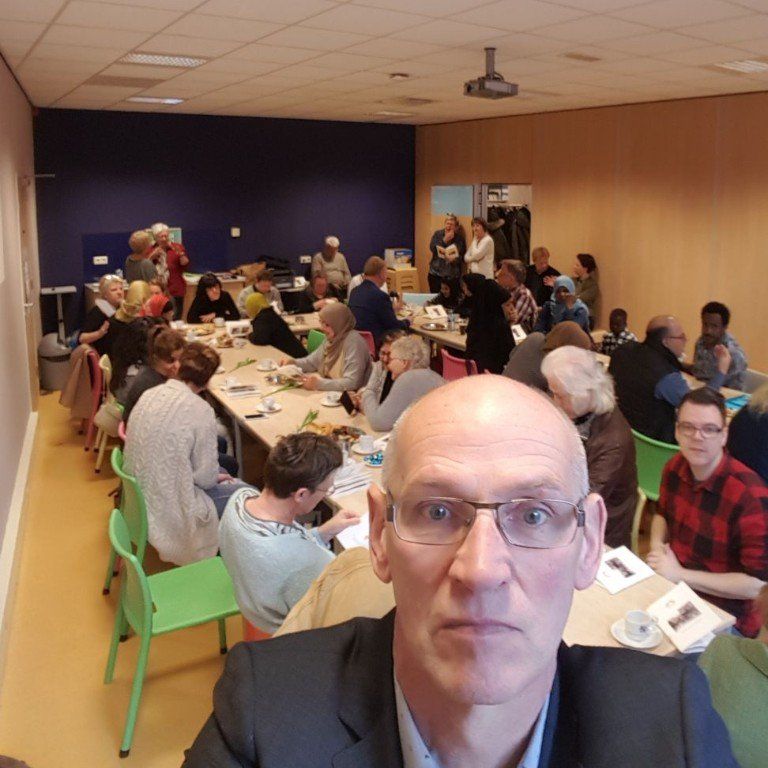
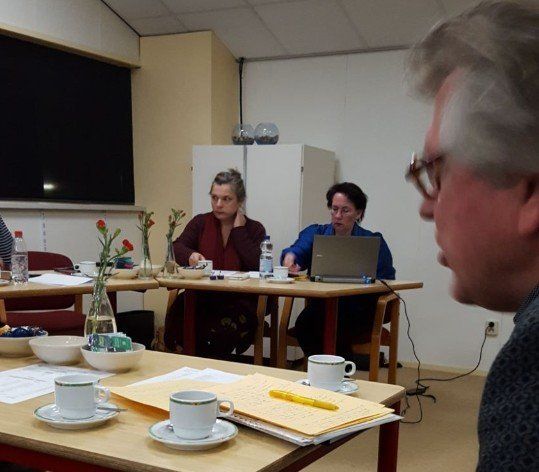
Members meeting of local interest Vinkega
Speakers Pier Winsemius informs interested parties about the risks of gas extraction.
Don't just rely on our words
VPPG Newsletter February 16, 2018
Without good justice there is no strong rule of law
The quality of the judiciary in the Netherlands is under pressure.
This was what Kees Sterk, member of the Council for the Judiciary, said in an expert debate on the state of the rule of law in the Senate.
The three state powers, the legislature, the executive and the judiciary, must work together to strengthen the rule of law, he said.
The court fees for regular jurisdiction are much higher than the actual costs. The Council believes that court fees should be reduced and that the government and parliament should encourage the use of justice and make it more accessible. The judiciary must also take responsibility for keeping regular justice attractive for every litigant, for example by better aligning processing times with the expectations of litigants.
A second point of concern is the independence of the Judiciary. "It is under pressure, and with it the quality of justice," says Sterk. The aim of the legislation regulating the funding of the Judiciary was to withdraw the financing of legal cases from the political process. In practice, it is now the case that budget problems of the Ministry of Justice and Security are increasingly leading in the financing of the Judiciary, Sterk said. 'The Council for the Judiciary believes that this practice is contrary to the intention of the law and affects judicial and institutional independence.
National parties enter local elections undercover
Now that the local parties are continuing their advance, the national political parties are going to infiltrate. This is a serious form of misleading voters.
Almost all national parties have laid down in their articles of association that local members may not be candidates for a local party if the national party also participates in that municipality. In the past, violation of this rule did not always result in members being expelled.
After all, every member provides a subsidy through the Political Parties Financing Act (Wfpp).
Now that 'Local' is booming, members of national parties are given permission to participate in municipal elections under a different (local-sounding) name. According to an article in Trouw, the PvdA members on those local party lists can also count on PvdA support, such as training and other types of involvement.
The Electoral Act in itself is contrary to the Constitution when it comes to the free mandate of council members and the requirement that a municipal council be autonomous. Only because of this can the Electoral Council approve these strange constructions. As a result, the infiltration of national parties continues to proliferate in local government. However, these parties now enter the elections disguised as local parties, which further undermines the independence and autonomy of the municipal councils.
The VPPG supports the call of Mr Kees Sterk, member of the Council for the Judiciary, that the three independent state powers must work together to strengthen the rule of law. They can ensure that the Electoral Act is corrected and that democracy is strengthened.
The report of the Evaluation and Advisory Committee on the Financing of Political Parties Act.
The total subsidy for the local parties amounts to almost 2.8 million euros. The average local party will then receive approximately 3,500 euros in subsidy. According to the Evaluation and Advisory Committee on the Financing of Political Parties Act (Wfpp).
The committee has noted that political parties at local level are not eligible for subsidies in the current Wfpp. According to the committee, this double inequality, where government subsidies are available for national parties, but not for local political parties, cannot be defended.
While the subsidy for the House seats amounts to a total of 6.2 million euros, the total subsidy amount for the local level must be equal to that for the national level.
In 2014, approximately 65% of the council seats were occupied by the local branches of the national parties and 35% by the local parties. This means that of these 6.2 million euros, roughly more than 4 million euros will benefit the local branches of the national parties and almost 2.2 million euros will go to the local parties. The local parties will receive an additional amount of 575,000 euros for their members.
The national parties already receive subsidies for their members at national level, which means that the local branches do not receive subsidies for their members. All in all, this means that a subsidy amount of approximately 6.8 million euros will be made available for local democracy. Both local parties and local branches of national parties that have won at least one seat in the municipal elections benefit from this new basis for subsidy. The committee also believes that the national parties are free in their (financial) agreements between the national organization and their local branches.
In an administrative agreement, agreements must then be made between the government on the one hand and the municipalities on the other, so that the amounts that are added to the Municipal Fund are actually paid out to the parties.
Since there are some issues with the proposed elaboration based on membership numbers, the professional association VPPG wishes to be involved in these agreements
You can download the report via this link (66 pages)
The PvdA itself will apply anonymously on March 21
A proposal from the PvdA is to make anonymous job applications possible so that certain groups in society have a greater chance of getting a job.
Opponents of applying anonymously consider applying anonymously to be a weakness: "Why should you have to hide your identity, it's all about your qualities?"
The PvdA is now putting into practice what they preach: they are entering the municipal elections disguised as a local party. In the meantime, they remain just as much a department of the national PvdA.
Is this development a sign of weakness or simply deceiving the voters? Or is it both?

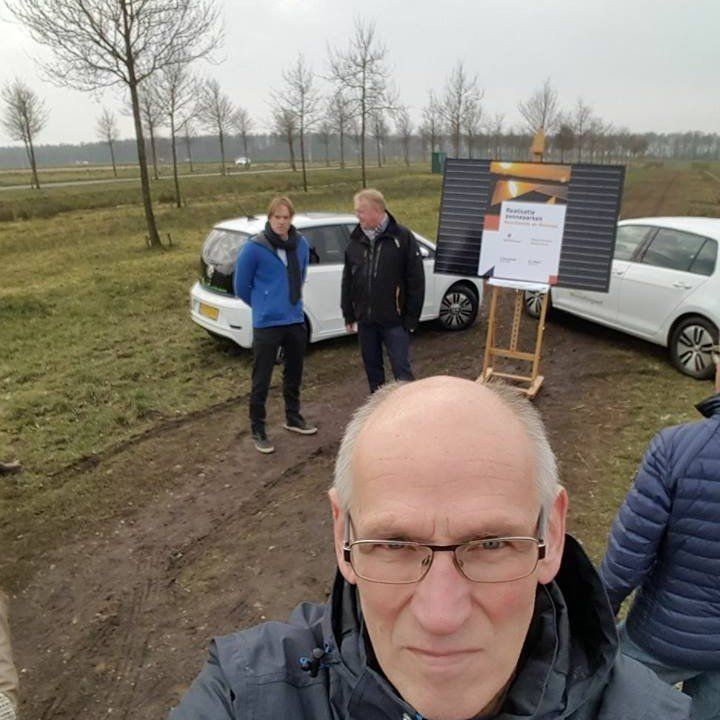
Solar panel park in Wolvega
Staystellingwarfs present at the signing for the rental of the land for the solar panel park in Wolvega and Noordwolde.
Remains Stellingwarfs is achieving success
Weststellingwerf closes the door on municipal merger
Noordwolde - The municipal reorganization is no longer a topic in Weststellingwerf. Two years ago, the 'Gateway to Friesland', a merger with Ooststellingwerf and Heerenveen, was still on the table.
At that time, a council majority still discussed a desired and inevitable administrative scale-up. During the first well-attended election debate in the Buurthuus in Noordwolde, no one wanted to burn their fingers again.
All time low
Weststellingwerf clearly spoke out of turn when expressing the wish to merge. And that was especially bad for the neighbors in Ooststellingwerf. Former mayor Gerard van Klaveren even thought it was the low point of his term. Until Thursday evening, the opponents of a merger, such as local parties such as Weststellingwerfs Belang and Nooit Stellingwarfs, thought they had a good topic on which to profile themselves as a party. And so the other party leaders did their best to take the wind out of their sails. For Cor Trompetter of the new combination party Sociaal Duurzaam Weststellingwerf (SDW), the discussion about a merger will no longer be held for the next four years. 'I've had my fill of it.' And if a proposal ever comes to the table, Trompetter wants to submit it to the citizens in a binding referendum. Even Ronald Westenberg of D66 thought it was 'a non-discussion', while D66 in Ooststellingwerf actually wants a merger. According to VVD party leader Jack Jongebloed, there is only reason for a merger if it benefits residents and the quality of governance is under discussion. And according to him, the latter is certainly not the case now. 'You have to be in it together.' These seven party leaders clearly had no interest in it anymore.
New neighborhoods do not use gas
They agreed with each other more often than they disagreed during the debate. GroenLinks even thought it was great that the parties share eighty percent of each other's policies. Nevertheless, there was no reason for GroenLinks to join the SDW collective to curb the fragmentation of the council. According to Trompetter, the door was slammed shut. Party leader Marlene Postma has honestly made no secret of the fact that she is aiming for victory through the 'Jesse Klaver effect'. She was also happy that there is so much attention to sustainability, although according to Trompetter, GroenLinks only revolves around energy. There was clearly broad support among the party leaders for no longer connecting houses to the gas network in new construction projects. But there is no affordable alternative for existing homes, according to SDW and VVD. Ton Mulder from Jouw Stellingwarfs again went to war against gas extraction, which is also an item at WB. According to Trompetter, this is piggybacking on sentiments in Groningen and, above all, mood-mongering. According to D66, you should not close your eyes to this. Frans Kloosterman (CDA) is going for wind turbines of fifteen meters high. The SDW prefers to spend the money that others want to put into a multifunctional center in Wolvega on loans through a new energy fund to tackle older energy-hungry houses, if people do not have the money for that themselves. The VVD was clearly more cautious in this regard.
Antiquities room and food bank
All parties also agreed on maintaining facilities. However, SDW went so far as to say that this must be done through an increase in property tax if necessary, although there is currently no reason for this. Jack Jongebloed (VVD) believes that after the recession and belt tightening, property tax should be reduced. According to Trompetter (SDW), a percentage reduction in property tax will not make any difference. He called that 'symbol politics'. He does not want to give the money back but would rather spend it on 'the social structure' such as the Leergeld Foundation. The Antiquities Chamber does not seem to have much to worry about in the future, provided good plans are made. WB can also discuss structural support for the Food Bank on the basis of a good plan. Only SDW wanted that too. The VVD was briefly reminded that the party did not want to provide even incidental support for this.
Money in village fund
Yes, accusations were also made regularly. According to D66, the municipality was 'not close enough to the residents'. Ronald Westenberg just didn't know an example. And with the tree issue in Oldeholtpade, according to Mariska Rikkers (WB), the municipality should have simply listened to the wishes of the street: sawn down. Which, according to Jack Jongebloed, also happened out of fear of losing votes. But the VVD party leader was still disappointed with all the mood-making 'even a poodle had gotten a red bottom due to pollen'. But it was clear to everyone that a modern municipality must respond to the wishes of the population. According to Jack Jongebloed you have to give people trust and responsibility. 'We shouldn't want to decide from Wolvega.' Once the SDW is in place, concrete agreements will be made with villages for four years. Almost all party leaders were persuaded by discussion leader Andries Ophof to donate at least a hundred thousand euros into a village-neighborhood fund. According to the CDA, much can be achieved with co-financing from funds.
Weststellingwerf closes the door on municipal merger
Noordwolde - The municipal reorganization is no longer a topic in Weststellingwerf. Two years ago, the 'Gateway to Friesland', a merger with Ooststellingwerf and Heerenveen, was still on the table.
At that time, a council majority still discussed a desired and inevitable administrative scale-up. During the first well-attended election debate in the Buurthuus in Noordwolde, no one wanted to burn their fingers again.
All time low
Weststellingwerf clearly spoke out of turn when expressing the wish to merge. And that was especially bad for the neighbors in Ooststellingwerf. Former mayor Gerard van Klaveren even thought it was the low point of his term. Until Thursday evening, the opponents of a merger, such as local parties such as Weststellingwerfs Belang and Nooit Stellingwarfs, thought they had a good topic on which to profile themselves as a party. And so the other party leaders did their best to take the wind out of their sails. For Cor Trompetter of the new combination party Sociaal Duurzaam Weststellingwerf (SDW), the discussion about a merger will no longer be held for the next four years. 'I've had my fill of it.' And if a proposal ever comes to the table, Trompetter wants to submit it to the citizens in a binding referendum. Even Ronald Westenberg of D66 thought it was 'a non-discussion', while D66 in Ooststellingwerf actually wants a merger. According to VVD party leader Jack Jongebloed, there is only reason for a merger if it benefits residents and the quality of governance is under discussion. And according to him, the latter is certainly not the case now. 'You have to be in it together.' These seven party leaders clearly had no interest in it anymore.
New neighborhoods do not use gas
They agreed with each other more often than they disagreed during the debate. GroenLinks even thought it was great that the parties share eighty percent of each other's policies. Nevertheless, there was no reason for GroenLinks to join the SDW collective to curb the fragmentation of the council. According to Trompetter, the door was slammed shut. Party leader Marlene Postma has honestly made no secret of the fact that she is aiming for victory through the 'Jesse Klaver effect'. She was also happy that there is so much attention to sustainability, although according to Trompetter, GroenLinks only revolves around energy. There was clearly broad support among the party leaders for no longer connecting houses to the gas network in new construction projects. But there is no affordable alternative for existing homes, according to SDW and VVD. Ton Mulder from Jouw Stellingwarfs again went to war against gas extraction, which is also an item at WB. According to Trompetter, this is piggybacking on sentiments in Groningen and, above all, mood-mongering. According to D66, you should not close your eyes to this. Frans Kloosterman (CDA) is going for wind turbines of fifteen meters high. The SDW prefers to spend the money that others want to put into a multifunctional center in Wolvega on loans through a new energy fund to tackle older energy-hungry houses, if people do not have the money for that themselves. The VVD was clearly more cautious in this regard.
Antiquities room and food bank
All parties also agreed on maintaining facilities. However, SDW went so far as to say that this must be done through an increase in property tax if necessary, although there is currently no reason for this. Jack Jongebloed (VVD) believes that after the recession and belt tightening, property tax should be reduced. According to Trompetter (SDW), a percentage reduction in property tax will not make any difference. He called that 'symbol politics'. He does not want to give the money back but would rather spend it on 'the social structure' such as the Leergeld Foundation. The Antiquities Chamber does not seem to have much to worry about in the future, provided good plans are made. WB can also discuss structural support for the Food Bank on the basis of a good plan. Only SDW wanted that too. The VVD was briefly reminded that the party did not want to provide even incidental support for this.
Money in village fund
Yes, accusations were also made regularly. According to D66, the municipality was 'not close enough to the residents'. Ronald Westenberg just didn't know an example. And with the tree issue in Oldeholtpade, according to Mariska Rikkers (WB), the municipality should have simply listened to the wishes of the street: sawn down. Which, according to Jack Jongebloed, also happened out of fear of losing votes. But the VVD party leader was still disappointed with all the mood-making 'even a poodle had gotten a red bottom due to pollen'. But it was clear to everyone that a modern municipality must respond to the wishes of the population. According to Jack Jongebloed you have to give people trust and responsibility. 'We shouldn't want to decide from Wolvega.' Once the SDW is in place, concrete agreements will be made with villages for four years. Almost all party leaders were persuaded by discussion leader Andries Ophof to donate at least a hundred thousand euros into a village-neighborhood fund. According to the CDA, much can be achieved with co-financing from funds.
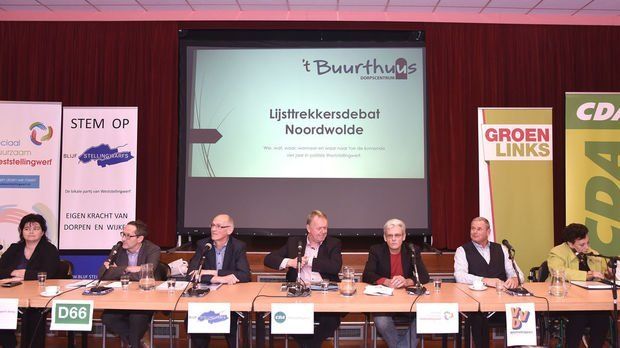

Support for Stay stellingwarfs
In the photo below you can see the people who support Stay Stellingwarfs in the upcoming municipal elections on March 21.
Election Commission draw Stay Stellingwarfs no. 7
On Friday February 9, 2018, the election commission approved the lists for the election. There were 2 new parties that had to draw lots for the list number. Stay Stellingwarfs has been awarded list 7 by drawing lots.
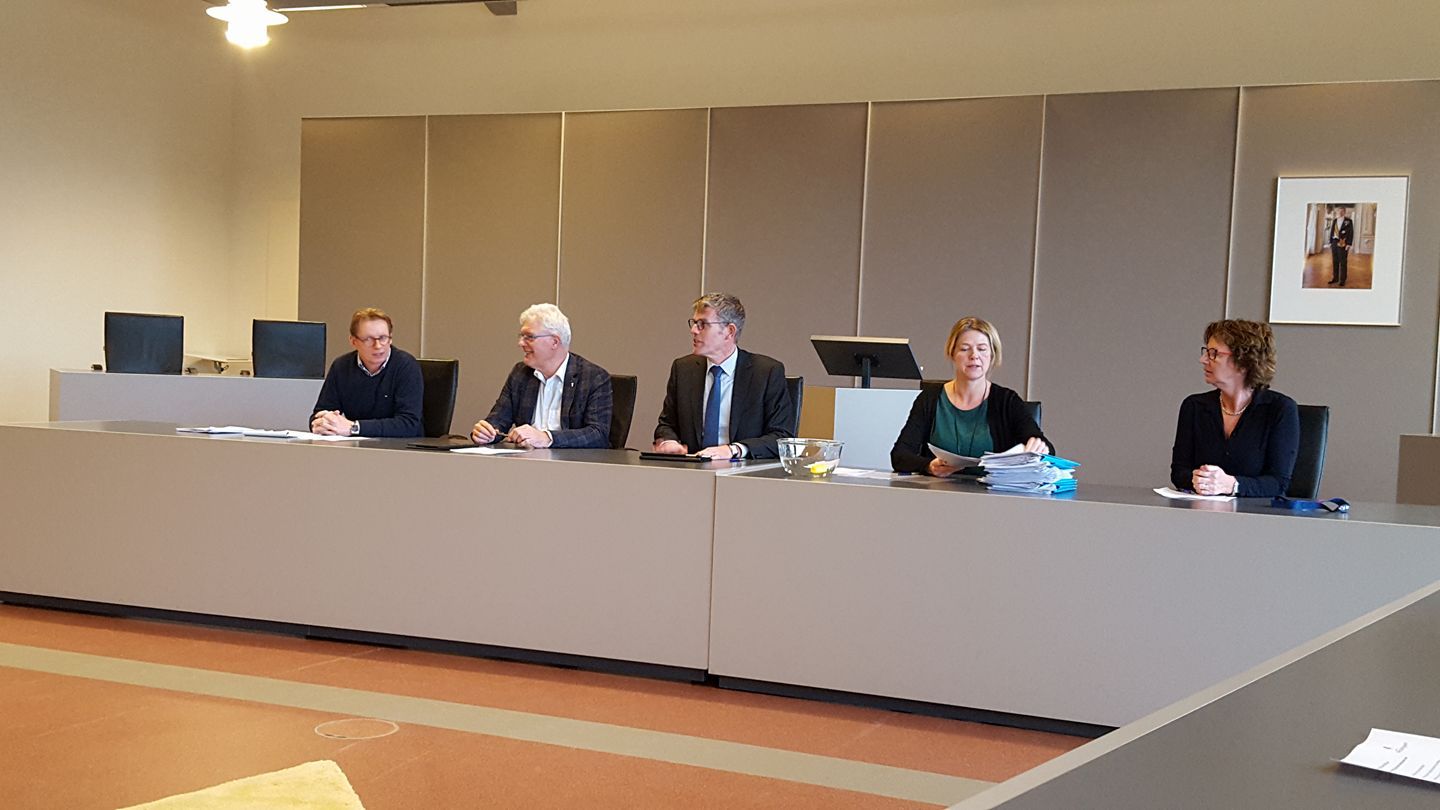
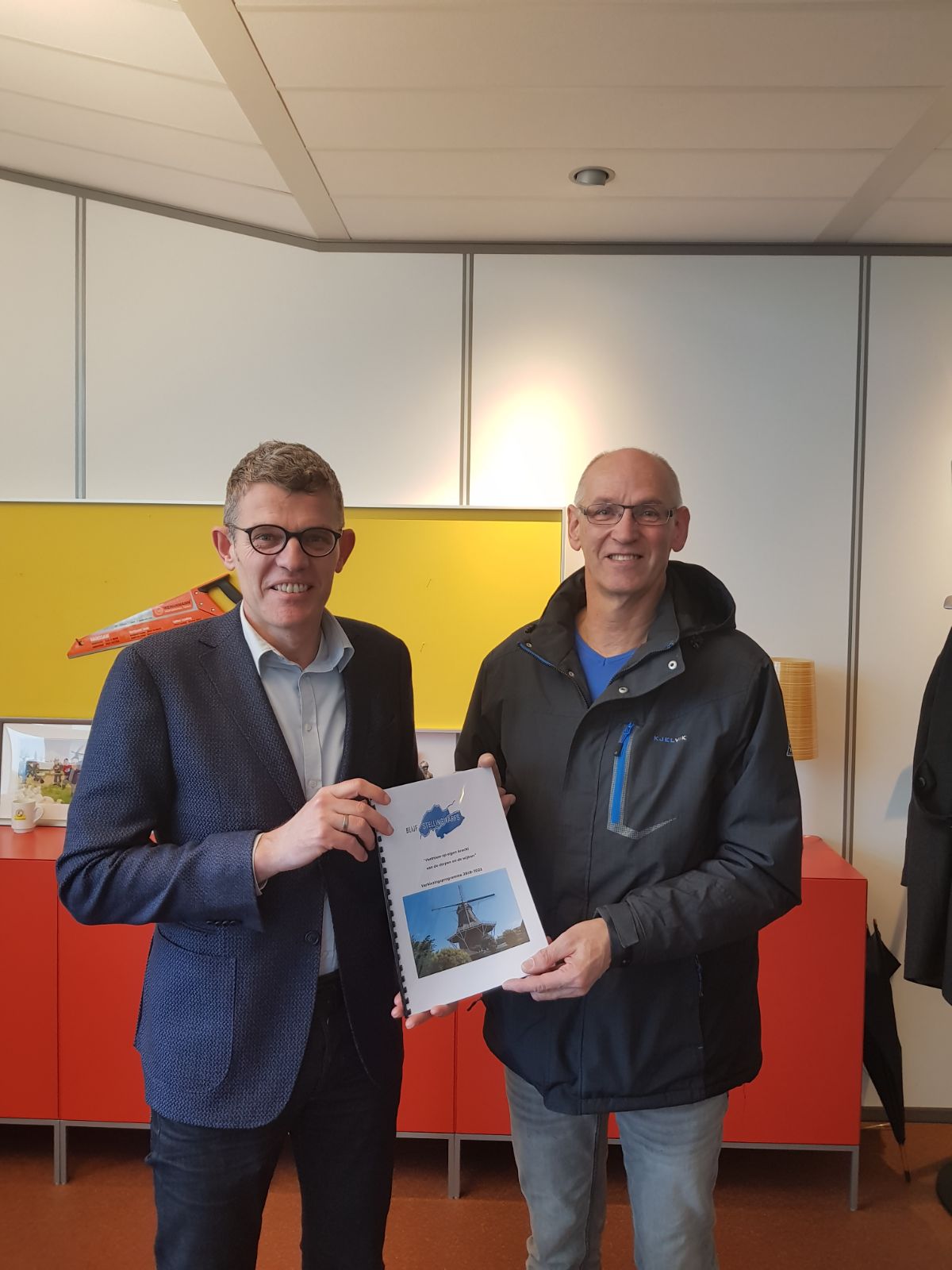
Staytellingwarfs presents election programme
Numbers one and two on the electoral list visited the mayor to officially present the election manifesto.
Wolvega members meeting a great success
On Wednesday, January 17, 2018, Jouw Stellingwarfs held its first general members meeting at Zalencentrum Klijnstra in Wolvega.
Chairman, Ton Mulder, was euphoric, he could welcome no fewer than 33 members and two non-members.
Because this was the first membership meeting, the agenda was quite full.
After the welcome speech, Ton guided the topics smoothly through the evening. He reported that ANBI status has almost been achieved.
Only a small adjustment needs to be made to the articles of association. The assignment has now already been submitted to the notary. A lot of copying took place after it arrived. A copy of identification must be submitted to the Municipality or the Election Commission for all members on the electoral list. The articles of association and internal regulations were approved. The treasurer had his job
well done. The chairman then explained the election protocol and the forms to be used.
A statement of support is requested from at least 20 members. D
This must be signed at the municipal counter and then by the official present. About 25 people have prepared themselves
declares to do this. Then the declaration of consent will follow later. In this letter, people declare that they agree to being on the electoral list and to the position mentioned. The entire form must be handed in to the municipality on February 5, the day of nomination.
The chairman continued with the election manifesto. After an extensive explanation and answers to a number of questions, it was
election manifesto established. After this, the electoral list was discussed. This had been preceded by careful preparation.
However, a few more changes followed. The first 20 of the electoral list now looks as follows: 1.Ton Mulder, 2.Ruud Knol, 3.Jaap Elzenaar, 4.Anton Mulder, 5.Marjan Venema, 6.Henk Fijma, 7.Simone Mulder, 8. Marty Bakker, 9.Gerardus Peeters, 10.Rene Hoornstra, 11.Sandor Postma, 12.Femke Lodewijk, 13.Bennie van Vleeren, 14.Martin Mulder, 15.Henk van Vleeren, 16.Marco Hofman, 17. Johan van Drogen ,18.Rudie Kasmarek, 19.Metje Landman, 20.Menno de Koe.
The two non-members registered spontaneously and will also appear on the electoral list.
There was now a pause.
The photographer had now arrived. Several photos were taken that could be used for promotional work.
Now that the break was over, the election campaign and promotional material were on the agenda. There were many useful suggestions here
forward, which will be elaborated in the coming weeks.
The Chairman was able to close the meeting around 10 p.m. and a pleasant dinner followed.
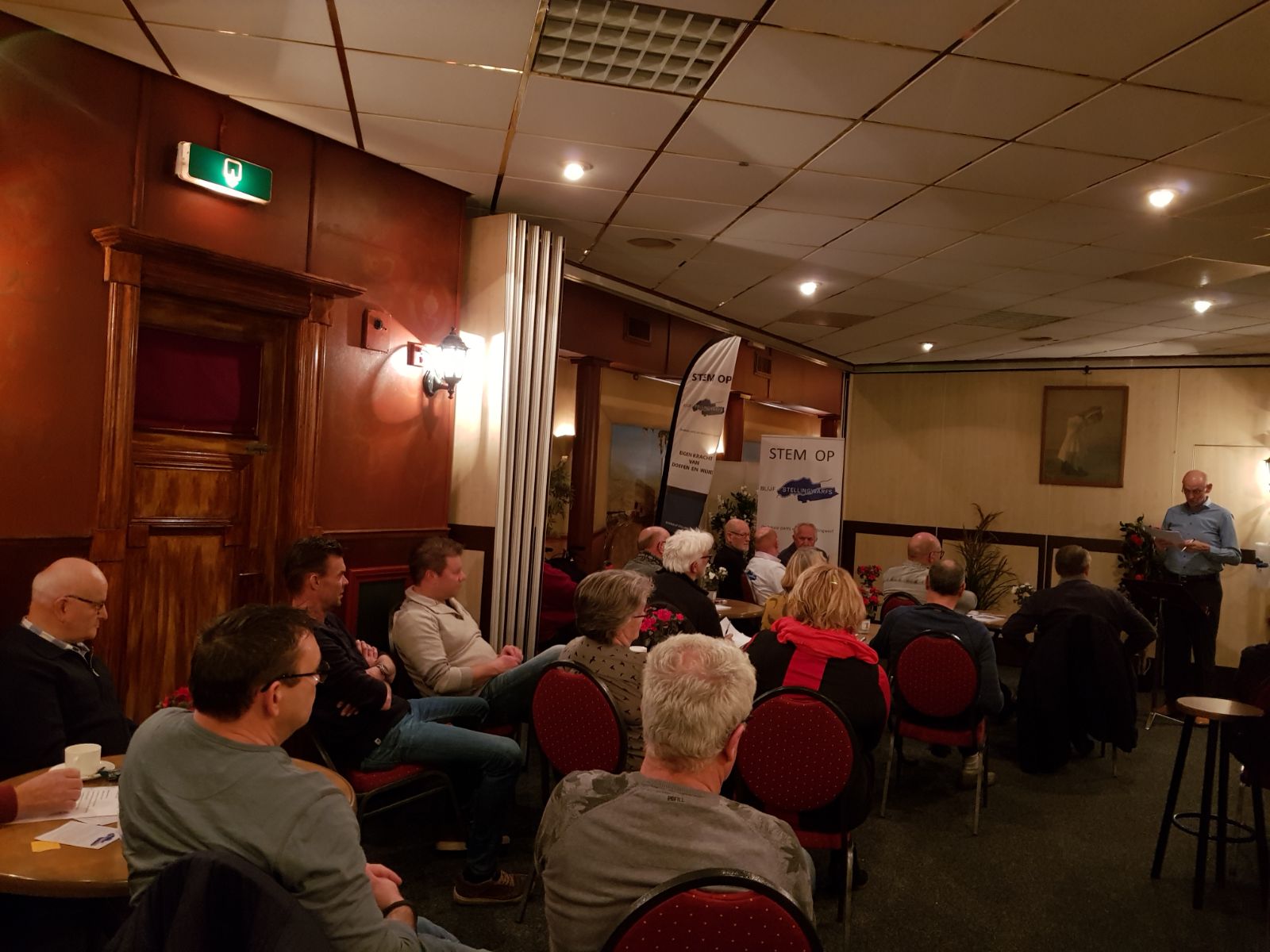
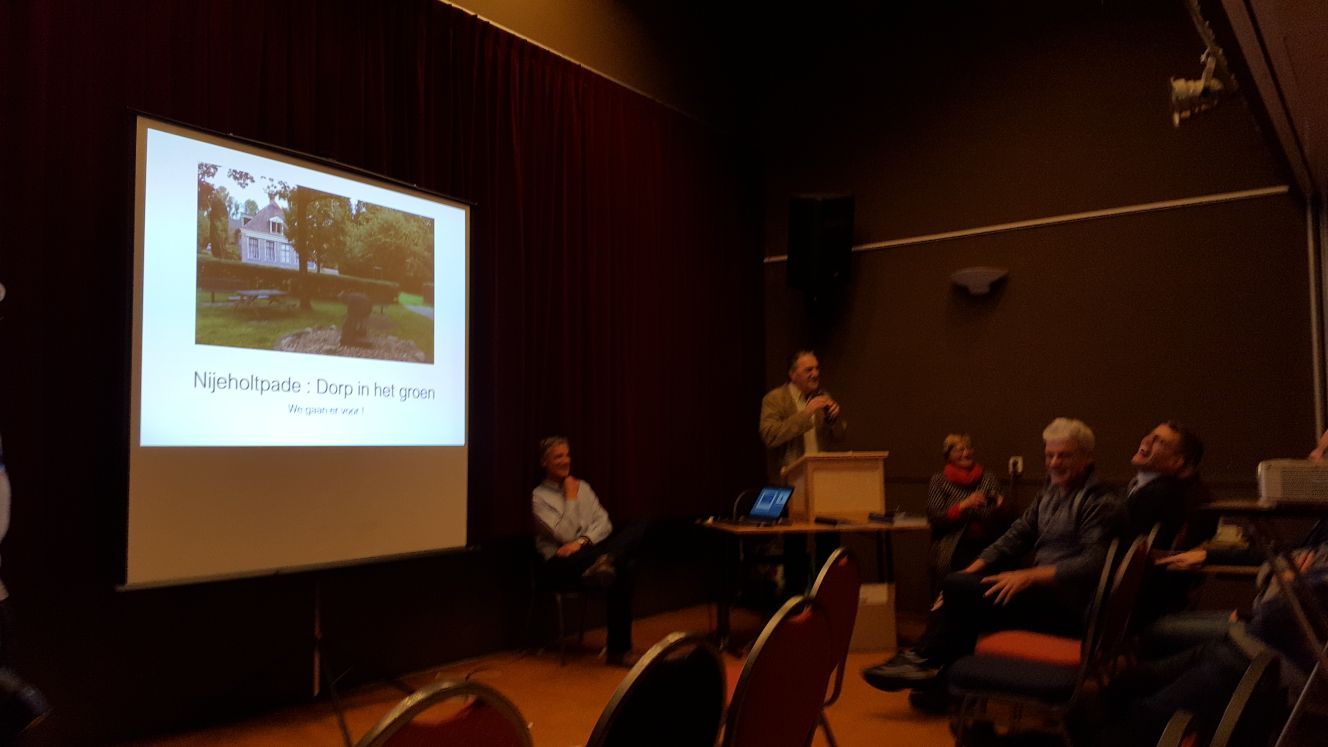
Nijeholtpade environmental vision
Stay Stellingwarfs during the presentation of the environmental vision by Nijeholtpade to the Municipality.
Large De Blesse delegation present at the council meeting
A large delegation of people from De Blesse was present in the Town Hall to draw the Council's attention to the fact that the residents of Blesse are now really aware that the Steenwijkerweg, Markeweg and Spoorlaan need to be renovated. Now it is up to the council and the council to put their words into action. Here is a photo of a delegation from De Blesse.
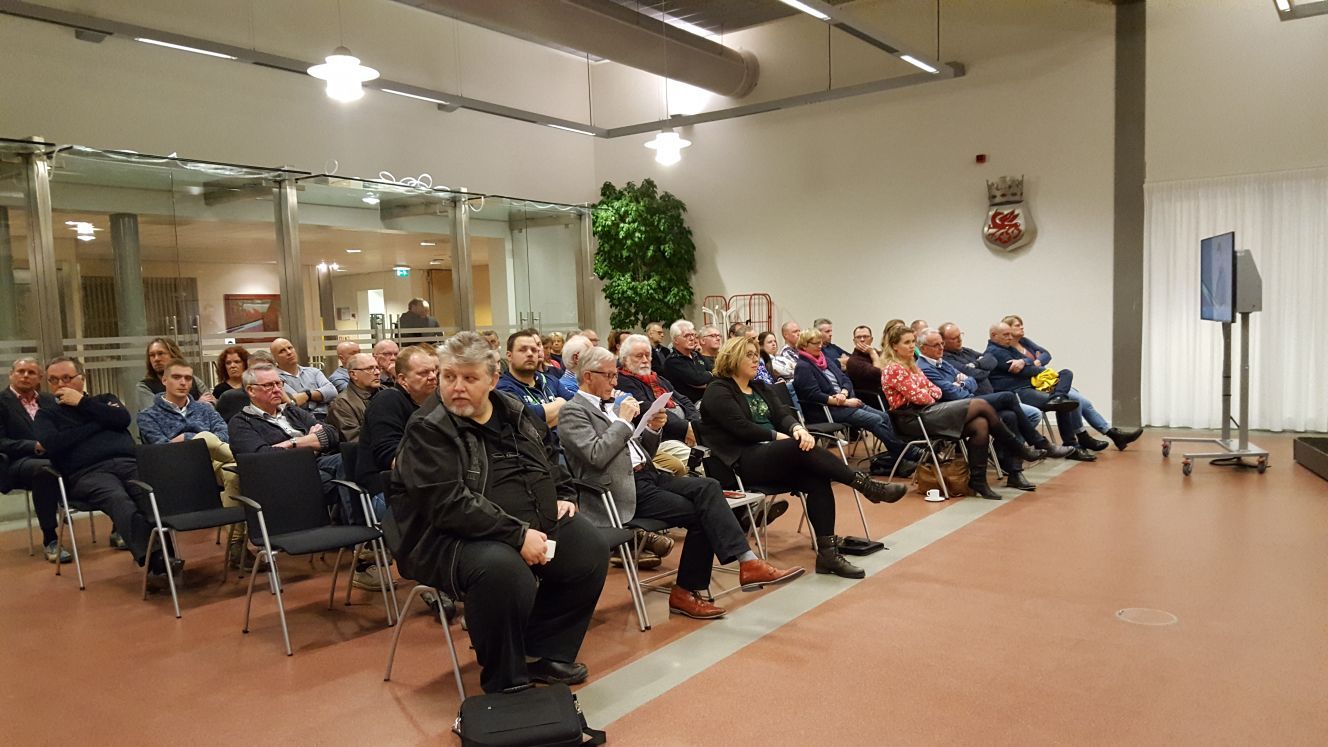
Contact details
Willem Lodewijkstraat, 28 8471 BJ, Wolvega
Phone: 0561-615579 (Ton)
Mobile: 06-46388137
Chamber of Commerce: 69348871
Bank: NL11INGB0007993883
RSIN:857841415
